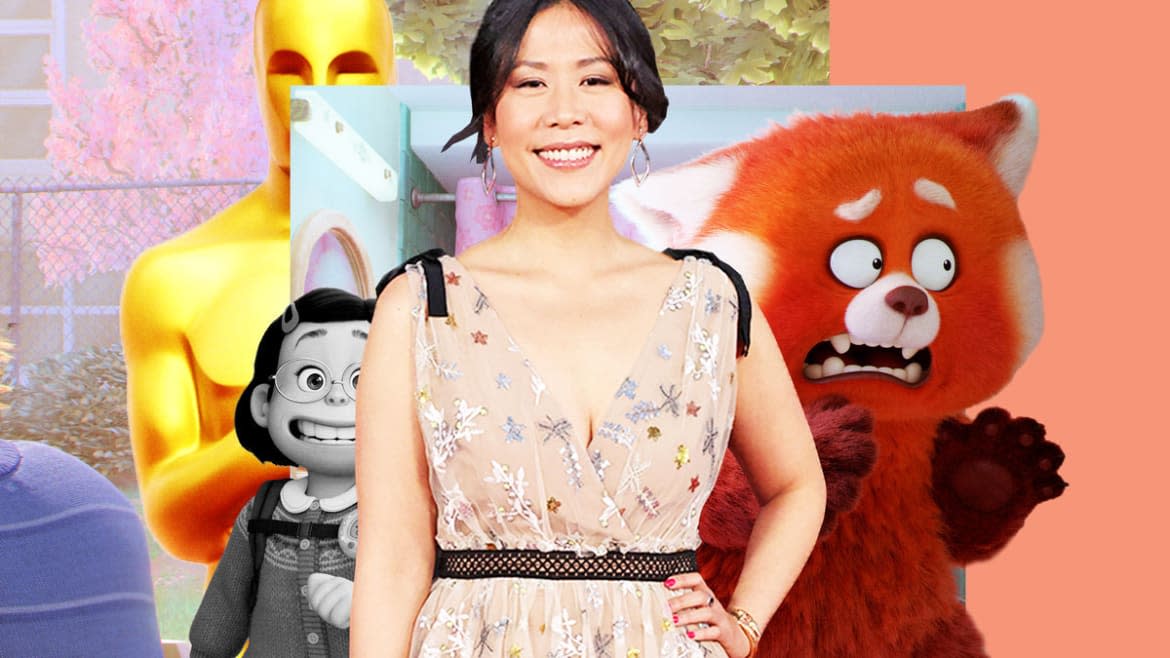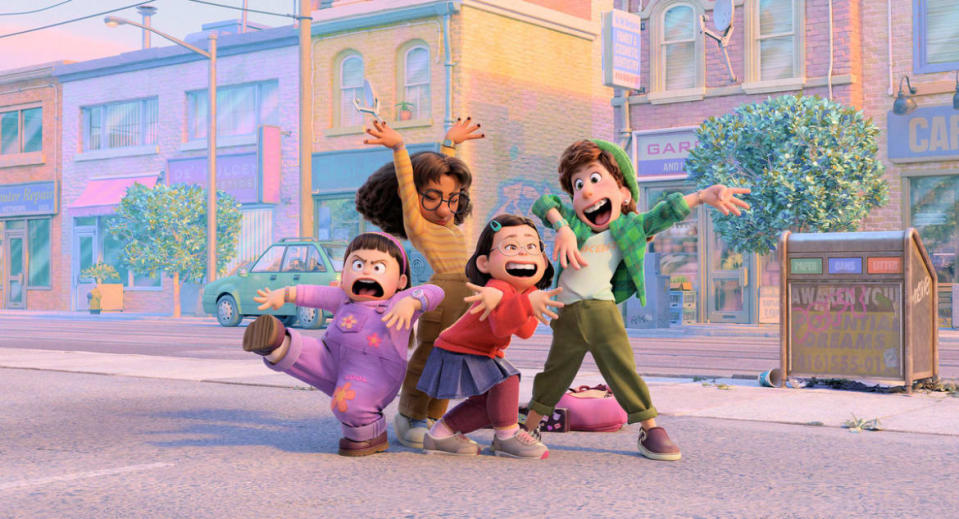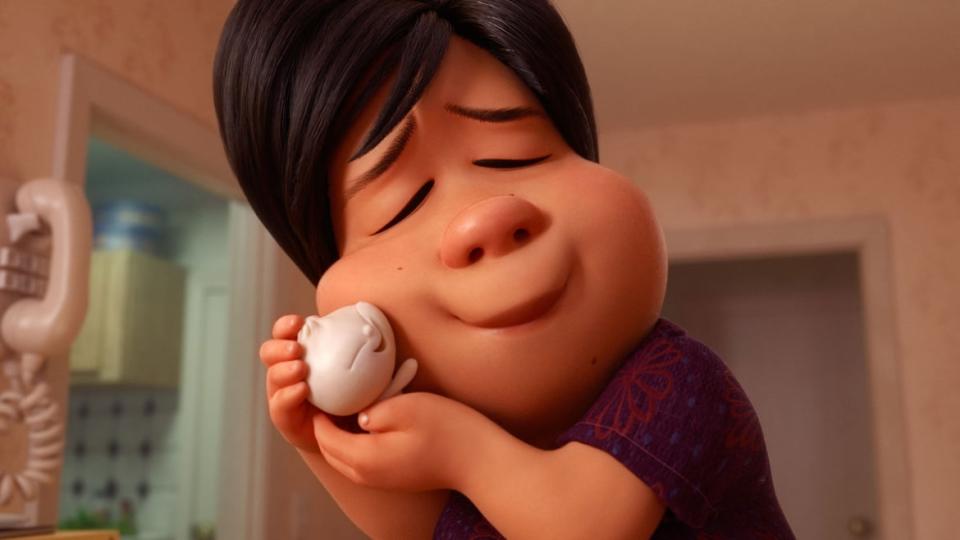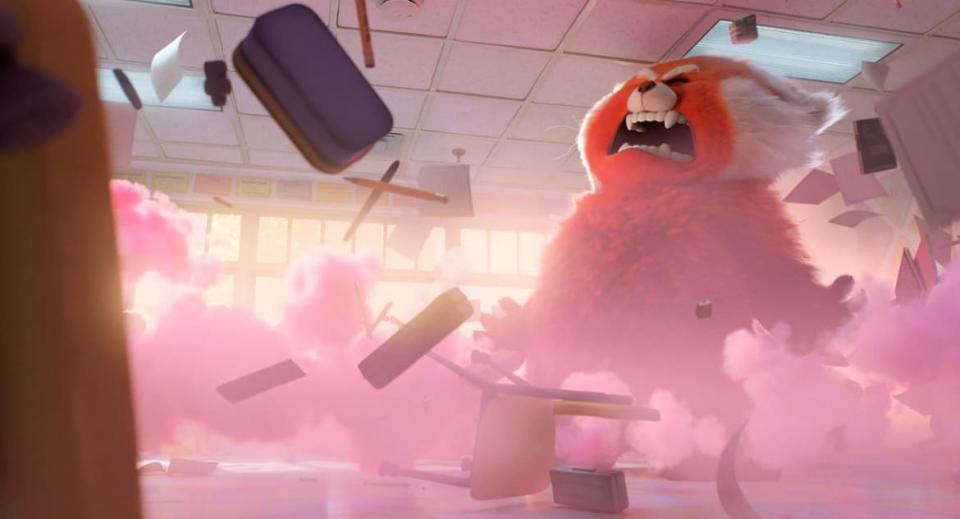‘Turning Red’ Director Domee Shi Talks Historic Oscar Nom, Backlash, and Why Voice Acting Deserves a Category

If Domee Shi scores the Oscar for Best Animated Feature this year for Pixar’s charming Turning Red, she’ll become the first woman director to win in the category on her own.
In the 22-year history of the Best Animated Feature category, only two women have won. Brenda Chapman and Jennifer Lee won for Brave and Frozen, respectively—but both split the award with their male co-directors.
“That’s crazy!” Shi says of this shocking fact over Zoom, a stack of plush red pandas behind her. “That’s nuts. It really shows that, man, change is slow. It’s something we have to keep on fighting for and advocating for. Even after our movie is done, I’m putting it upon myself to make sure the door is open for more filmmakers like me to come in.”

Turning Red follows Mei (Rosalie Chiang), a perky pre-teen on the verge of puberty. But for the young Chinese-Canadian girl, growing up brings a different beast than just tampons and acne: Like her mother Ming (Sandra Oh), as she begins to mature, she turns into a giant red panda whenever she feels excited or enraged. The women in her family have one chance to remove this red panda curse from their bodies; while all of Mei’s aunts and her mother have rid themselves of the panda, Mei takes a liking to the beast.
After its release last March, the Pixar movie was celebrated by critics, faced a bit of backlash for featuring “adult” themes (let’s remember—12 is the average age a person with a uterus begins their period; still coming in under a PG-13 rating), and went on to earn a much-deserved Oscar nom for Best Animated Feature.
Shi already has an Oscar for her short film Bao, which won Best Animated Short in 2018. The animator has been with Pixar since 2011, when she accepted an internship working with a storyboard team, and has been moving up in the ranks at the Disney-owned animation studio ever since. Now, Shi is the vice president of creative, alongside longtime company figureheads like Andrew Stanton, Peter Sohn, and Dan Scanlon.
The 12 Best Animated Movies and Shows of 2022
Since her promotion, Shi has been attempting to open doors for a more diverse range of storytellers at the company. “I love talking about and bringing up my awesome female colleagues who are up and coming,” Shi says. “I love bragging about them.” Widening the pool just a bit, Shi says, can help more underrepresented voices work their way up to Hollywood blockbusters and Oscar nominations.
Ahead of the Oscars ceremony, Shi chatted about Turning Red’s nom with The Daily Beast’s Obsessed, teasing what’s next for her at Pixar, pining for a Best Voice Acting category in the awards, and pitching A Goofy Movie 3.
You’ve already won the Academy Award for Best Animated Short. Has anything changed, moving up to a nod for Best Animated Feature?
It felt crazy when I was nominated for a short, and then it also just feels crazy now. At least for me, there was more pressure to get this nomination. I put a lot of pressure on myself. [Turning Red] is a much bigger production [than Bao]. It’s a much bigger project. There was a lot riding on this film. There are a lot of firsts in this movie. It’s the first film from Pixar that’s led by a predominantly female leadership team. It’s the first to feature an Asian female lead. It’s the first to not shy away from the ugliness and cringiness and embarrassment of female puberty and menstruation.
There’s a lot of firsts in this movie, and when we were making it, we didn’t know if it was going to resonate with people. In the back of my mind, I knew. I hoped! But to have the nomination is huge. It hopefully shows studios that when you invest in diverse storytellers and take a chance on a crew, that it will be commercially and financially successful. Universal stories can look like our movie and can be made by people that look like us.

In an interview with The Hollywood Reporter, you mentioned that we have to keep championing diverse stories because we “could so easily go backward.” In what ways can Hollywood and the Academy prevent that regression?
I can only speak for myself and what I’m trying to do to keep myself accountable. If you do find success, make sure you’re paying it forward as well. Make sure you’re mentoring and reaching out and trying to help the next generation.
For me, I made that my priority—I’m not going to be the only one in this room! Small things like that, when you’re going to a meeting and seeing who’s invited to the meeting, asking, “Can we invite so and so to mix it up a little bit?” That should be a point in your conversations when you’re in the workplace. I love talking about other artists and people that I’ve identified [with], and really boosting them up.
I was rooting for some nominations for 4*Town at this year’s Oscars. They got snubbed!
I’m bummed out! But of course, I’m biased. I think they’re the greatest animated band of this year. I really wanted to see them perform on the global stage. All we have are the music videos to console ourselves with. Maybe if there’s enough of a ruckus, and enough people want it, they could put a live performance on somewhere at some point.
Some viewers have advocated for a “Best Voice Acting” category at the Oscars. What’s your stance on that?
It would help legitimize animation as a medium and not a genre. The voice actors do so much work. They’re in the studio recording so much, putting their everything into it. Voice acting is acting. In the same sense, the supervising animator should also be co-nominated with the voice actor, because the animator is just as much of an actor as well. They’re going in there, feeling out the scene and the dialogue, adding facial expressions with micro-muscle movements. That’s so much work and artistry as well. I’m all for adding those categories.
There was a bit of backlash against Turning Red’s scenes about Mei’s period, with trolls saying that they weren’t “appropriate” for young children. How do you think we can mute the trolls?
I’m always so confused by the backlash. [Puberty and periods] just seem so normal to me—and to a lot of us, right? When we were writing those scenes in the movie, we just wanted to write what was true to our own experiences during puberty, and what would be the most embarrassing, funny, and cringey things we could put our main character through to get her red panda to trigger. This scenario, where her mom shows up at her school holding a bunch of pads, it felt so funny and horrifying. Wouldn’t anyone want to burst into a big pink smoke cloud in that moment?
That’s where our thinking was at that time. How do we get our character through the puberty gauntlet? It wasn’t like a “tampon agenda” or anything like that. The only thing we can do to handle all of the backlash and people who are up-in-arms about these scenes is to put more tampons into movies and TV shows to normalize it. It’s about time. Half of the world gets their period. It’s not a big deal, and it shouldn’t be a big deal.

Were there any inspirations that led you to write that scene about tampons and pads?
I don’t think I’ve seen tampons in an animated film or TV show. That was also what drove me to … put these types of scenes in the movie. I wish I had a movie like this when I was 13 and going through my first period. I literally was like Mei. I locked myself in the bathroom and thought I was dying. I didn’t know what was going on. I was too scared to tell my mom, too embarrassed, because I didn’t learn anything in school.
It’s great that our movie is going to encourage these conversations to happen. Kids need to hear it. They’re going to deal with it, and you don’t want them to think that they’re dying or that something’s going on. You don’t want them to be confused or scared. You want them to deal with it in a normal way. This is normal! Aw, crap, ruined a pair of underwear—but it’s not the end of the world.
I feel like I only heard about periods in books like Are You There, God? It’s Me, Margaret.
Yes! And even in advertisements, they pour blue liquid on it. It’s never red. That made me think, like, “Is it blue? Is my period blue?” [Laughs]
Three out of the four most recent Pixar movies—Soul, Luca, and Turning Red—have been released on Disney+ instead of theatrically. You have a new movie in the works. Are you excited by the opportunity to debut that on the big screen?
I love watching movies in theaters and experiencing movies collectively. There’s an energy and an excitement while watching a movie—especially our movies—with a crowd of people. The way we craft our movies, they’re meant to be experienced on the big screen. We spend so much time and work lovingly tailoring the clothes, and shading the skin, lighting, and adding dust particle effects in the air that will bounce off the light and look just right.
That is, for me, the best way to experience these films. But at the same time, I understood why we had to put Turning Red on Disney+. This was at the tail end of the pandemic, and families weren’t returning to theaters yet. Our goal was just to get this movie seen and experienced by as many people as possible, so that became the best option.
This is a little off-topic, but you said A Goofy Movie was a big inspiration for Turning Red. There’s a bit of a cult following behind that movie and its sequel—would you ever want to revive it for a third film?
Yeah, definitely. We follow [Goofy’s son] Max, and he’s a dad now—but then, would Goofy be a granddad? Would he be old? That would be really fun. Max would be one of those old skater dads. He would be a dad, but he’d still try to be cool and say ’90s phrases to his Gen Z, Gen Alpha kids. Maybe Powerline would still be popular, but he’s older. Let’s make it happen!
Get the Daily Beast's biggest scoops and scandals delivered right to your inbox. Sign up now.
Stay informed and gain unlimited access to the Daily Beast's unmatched reporting. Subscribe now.

 Yahoo News
Yahoo News 
